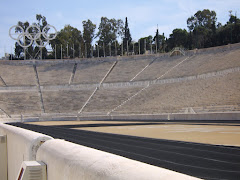 Last week Dick Ebersol resigned from NBC Sports, where he championed the network's signature style for presenting the Olympics. Though this is a big change for NBC, the IOC and the Olympic Movement, this is, to me, a change for the better.
Last week Dick Ebersol resigned from NBC Sports, where he championed the network's signature style for presenting the Olympics. Though this is a big change for NBC, the IOC and the Olympic Movement, this is, to me, a change for the better.The change also provides a real opportunity for the next Olympic broadcast producer to right things that NBC skewed a bit in the last 20 or so years of five-ringed telecasts.
I'm not a fan of NBC's "storytelling" method for showcasing the "Olympic drama" -- though it was an interesting approach that I first noticed during a Barcelona 1992 Olympic segment regarding the surviving family members of the 1972 Munich Olympic terrorist attack, to me the NBC/Ebersol presentations of the Games jumped the shark with the over-the-top broadcast of Kerri Strug and her stuck landing in Atlanta Olympic gymnastics competition.
Why does the NBC style bother me?
During the Atlanta Olympics, some Olympic Village colleagues and I learned about the IOC's live feeds that provide commercial and commentary-free channels of all warm-ups and competitions in progress. It is possible, in the Olympic Village and other Olympic venues, to view the "gymnastics channel" or "tennis channel" or any other Olympic sport channel courtesy of multiple camera positions inside each venue, broadcast via the International Broadcast Center (IBC).
While most of America was watching/listening/enduring John Tesh nearly soiling himself over Kerri Strug's Olympic feat, I was watching the same drama unfold with commentary-free comfort of the Olympic Village. The drama was just the same -- perhaps more so -- as we also got to see athletes compete who were ignored by NBC.
Once you've viewed the Olympics in this commentary/commercial-free format, there is no topping it (unless, of course, you have a ticket to an Olympic event and view it live and in person).
To me, NBC continuously misses the boat by adding over-the-top commentary and "storytelling" to the mix. The Olympic "drama" of the world's best athletes is all the drama one needs -- viewers don't need Tesh droning on and on with faux-expertise.
To his credit, I do usually enjoy Bob Costas' informed perspective on competition, and select sports commentators also bring some interesting flavor to the mix. Also, to Ebersol's credit, he did take the Olympic viewer experience to a new plane, and the Olympic Order bestowed upon him is deserved. The Olympic Movement is better for all of Ebersol's creativity, leadership and contributions.
I just wish NBC would cut back on the storytelling and showcase a broader international mix of the real drama of global competition. People will watch it with as much, if not more, interest, in my opinion.
No matter which network picks up the U.S. Olympic broadcasting rights for Sochi 2014 and Rio de Janiero 2016 in a few weeks, when the IOC determines the Games broadcaster of the two post-London 2012 Olympiads, I hope they will seize this post-Ebersol opportunity to assess the IOC commentary-free format and consider a sport-by-channel offering that will let the viewer determine for themselves the "drama" unfolding on screen.
Could be a real treat for viewers to enjoy IOC-pure format (with all the new technology at everyone's fingertips, why not empower viewers with on-screen options to learn more about ALL of the athletes in the competition rather than only the Americans?).
Chicago Tribune Olympic reporter Philip Hersh also poses some interesting questions about Ebersol worth a read at the Globetrotting blog.
It will be interesting to see where Ebersol turns up next in Olympic circles.















